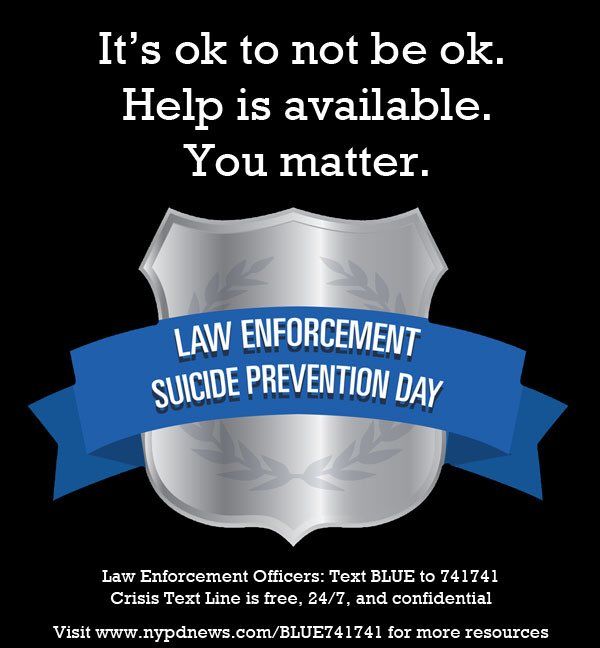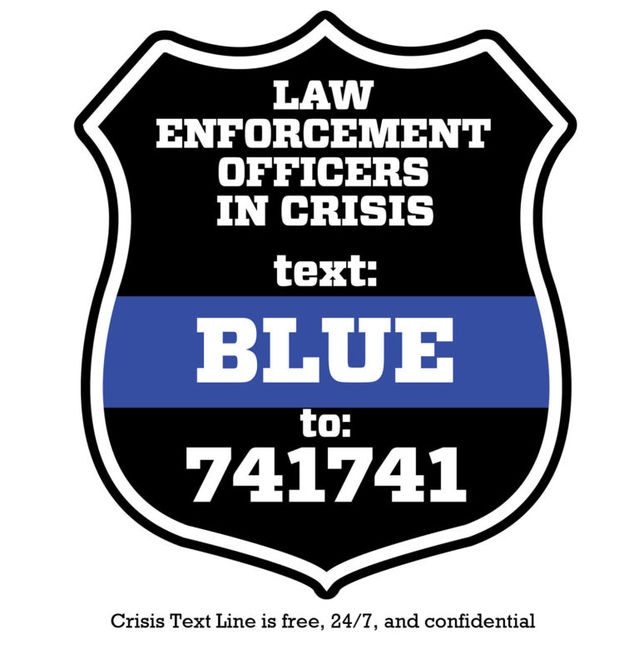Suicide
Law Enforcement Suicide Prevention
More officers die by suicide than are killed in the line of duty each year.
Posted September 25, 2018

Police officers across the country are tasked with many things including helping people work through crises every day. The expectations of officers are high- they are held to a greater standard where each crisis incident is expected to conclude peacefully with voluntary compliance. Police officers receive training on how to de-escalate these tense situations which are difficult because although the men and women in “blue” are there to help the person, the situation can become complicated because the person in crisis does not always realize they need help or they do not want the officers help due to the severity of their condition. Regardless, the officers persevere and work diligently together towards that goal.

This superhero perception the public has on police officers has recently also been tempered with broad-based claims generalizing all officers as villains, racists, biased, and ill-prepared to handle certain situations. Further, just because a situation does not end with voluntary compliance does not automatically mean the officer did something wrong. In the world of all to frequently “judge now, get facts later... maybe” creates an internal anguish that can have a detrimental effect on officers and others.
Despite these gross characterizations of officers the single truth that remains is regardless of how you describe the men and women in law enforcement, they are ultimately that- men and women. They are humans that have voluntary taken on the role of protector but they still have emotions, feelings, as well as mental and physical health needs and concerns.
These men and women were not forced into this line of work but it does take its toll. It interferes with regular sleeping patterns, it disrupts family and social functions (such as missing Christmas, Thanksgiving, and Fourth of July barbecues), wreaks havoc on attempts at eating healthy, and manages to cancel out the most well-planned out workout regimen.
Compound that with some of the horrors they are faced with- encountering victims of crimes including children, being assaulted, and witnessing other terrible events that people would never believe to be real.
But it is real.
And these officers do witness it and it takes its toll on every single officer however their coping strategies are different and not always ideal or the most effective. According to recent research by the Ruderman Foundation, that toll can be deadly in the form of completed suicide. Police officers die by suicide each year more than being killed in the line of duty.
Let that sink in for a moment. Our heroes in blue die each year more by suicide than being killed by others.
For those officers that cannot cope with these hardships, suicide is not necessarily the end result either. The result can be other negative, prolonged suffering on a wide-scale: abusing alcohol, failed relationships, isolation, poor mental and physical health, or ignoring the onset of a mental illness.
If you are a police officer in the United States listen to the message Dr. Christine Moutier, Chief Medical Officer of the American Foundation for Suicide Prevention, has to say. Watch the video below:
What Dr. Moutier says is true, you do a great job helping people every day- make sure you are taking care of yourself. For those officers who are doing well, take a moment to check in on a fellow officer. Let them know help is available and they have options (see below for those options).
For family, friends, neighbors and community members
Many of you know a police officer- check in with them to see how they are doing. Let them know of the resources that are available to them. Not sure how to do that? Start with asking them if they are ok? Get trained in Mental Health First Aid and also consider getting trained in ASIST. Take it a step further and consider being a trained crisis counselor with the Crisis Text Line or the National Suicide Prevention Life Line.
Everyone can do something to help try and stop suicide in policing and beyond.
Options for help:
- Most departments have internal employee assistance and peer support programs (a quick internet search can help you)
- Text BLUE to 741741. Crisis Text Line is a free, 24/7, and confidential crisis text service [more]
- Call 1-800-273-TALK (8255). The National Suicide Prevention Lifeline is there to help [more]
- Always call 911 in an emergency
More information:
- Learn about how to speak with someone you are concerned for with tips from the NYPD [here]
- Get trained in Mental Health First Aid [here] and learn more about the ASIST training [here]
- The National Alliance for Mental Illness provides insight on mental illnesses, support groups and much more [more]
- Learn about the warning signs and risk factors of suicide from the American Foundation for Suicide Prevention [here]
- More on police officer suicide prevention from the IACP [here]




